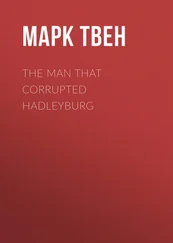Mark Twain - The Man That Corrupted Hadleyburg and Other Stories
Здесь есть возможность читать онлайн «Mark Twain - The Man That Corrupted Hadleyburg and Other Stories» весь текст электронной книги совершенно бесплатно (целиком полную версию без сокращений). В некоторых случаях можно слушать аудио, скачать через торрент в формате fb2 и присутствует краткое содержание. Год выпуска: 2004, Жанр: Классическая проза, Юмористическая проза, на английском языке. Описание произведения, (предисловие) а так же отзывы посетителей доступны на портале библиотеки ЛибКат.
- Название:The Man That Corrupted Hadleyburg and Other Stories
- Автор:
- Жанр:
- Год:2004
- ISBN:нет данных
- Рейтинг книги:4 / 5. Голосов: 1
-
Избранное:Добавить в избранное
- Отзывы:
-
Ваша оценка:
- 80
- 1
- 2
- 3
- 4
- 5
The Man That Corrupted Hadleyburg and Other Stories: краткое содержание, описание и аннотация
Предлагаем к чтению аннотацию, описание, краткое содержание или предисловие (зависит от того, что написал сам автор книги «The Man That Corrupted Hadleyburg and Other Stories»). Если вы не нашли необходимую информацию о книге — напишите в комментариях, мы постараемся отыскать её.
The Man That Corrupted Hadleyburg and Other Stories — читать онлайн бесплатно полную книгу (весь текст) целиком
Ниже представлен текст книги, разбитый по страницам. Система сохранения места последней прочитанной страницы, позволяет с удобством читать онлайн бесплатно книгу «The Man That Corrupted Hadleyburg and Other Stories», без необходимости каждый раз заново искать на чём Вы остановились. Поставьте закладку, и сможете в любой момент перейти на страницу, на которой закончили чтение.
Интервал:
Закладка:
The recent troubles have grown out of Count Badeni's necessities. He could not carry on his Government without a majority vote in the House at his back, and in order to secure it he had to make a trade of some sort. He made it with the Czechs—the Bohemians. The terms were not easy for him: he must issue an ordinance making the Czech tongue the official language in Bohemia in place of the German. This created a storm. All the Germans in Austria were incensed. In numbers they form but a fourth part of the empire's population, but they urge that the country's public business should be conducted in one common tongue, and that tongue a world language—which German is.
However, Badeni secured his majority. The German element in Parliament was apparently become helpless. The Czech deputies were exultant.
Then the music began. Badeni's voyage, instead of being smooth, was disappointingly rough from the start. The Government must get the Ausgleich through. It must not fail. Badeni's majority was ready to carry it through; but the minority was determined to obstruct it and delay it until the obnoxious Czech-language measure should be shelved.
The Ausgleich is an Adjustment, Arrangement, Settlement, which holds Austria and Hungary together. It dates from 1867, and has to be renewed every ten years. It establishes the share which Hungary must pay toward the expenses of the imperial Government. Hungary is a kingdom (the Emperor of Austria is its King), and has its own Parliament and governmental machinery. But it has no foreign office, and it has no army—at least its army is a part of the imperial army, is paid out of the imperial treasury, and is under the control of the imperial war office.
The ten-year arrangement was due a year ago, but failed to connect. At least completely. A year's compromise was arranged. A new arrangement must be effected before the last day of this year. Otherwise the two countries become separate entities. The Emperor would still be King of Hungary—that is, King of an independent foreign country. There would be Hungarian custom-houses on the Austrian border, and there would be a Hungarian army and a Hungarian foreign office. Both countries would be weakened by this, both would suffer damage.
The Opposition in the House, although in the minority, had a good weapon to fight with in the pending Ausgleich. If it could delay the Ausgleich a few weeks, the Government would doubtless have to withdraw the hated language ordinance or lose Hungary.
The Opposition began its fight. Its arms were the Rules of the House. It was soon manifest that by applying these Rules ingeniously it could make the majority helpless, and keep it so as long as it pleased. It could shut off business every now and then with a motion to adjourn. It could require the ayes and noes on the motion, and use up thirty minutes on that detail. It could call for the reading and verification of the minutes of the preceding meeting, and use up half a day in that way. It could require that several of its members be entered upon the list of permitted speakers previously to the opening of a sitting; and as there is no time-limit, further delays could thus be accomplished.
These were all lawful weapons, and the men of the Opposition (technically called the Left) were within their rights in using them. They used them to such dire purpose that all parliamentary business was paralysed. The Right (the Government side) could accomplish nothing. Then it had a saving idea. This idea was a curious one. It was to have the President and the Vice-Presidents of the Parliament trample the Rules under foot upon occasion!
This, for a profoundly embittered minority constructed out of fire and gun-cotton! It was time for idle strangers to go and ask leave to look down out of a gallery and see what would be the result of it.
II. A MEMORABLE SITTING.
And now took place that memorable sitting of the House which broke two records. It lasted the best part of two days and a night, surpassing by half an hour the longest sitting known to the world's previous parliamentary history, and breaking the long-speech record with Dr. Lecher's twelve-hour effort, the longest flow of unbroken talk that ever came out of one mouth since the world began.
At 8.45 on the evening of the 28th of October, when the House had been sitting a few minutes short of ten hours, Dr. Lecher was granted the floor. It was a good place for theatrical effects. I think that no other Senate House is so shapely as this one, or so richly and showily decorated. Its plan is that of an opera-house. Up toward the straight side of it—the stage side—rise a couple of terraces of desks for the ministry, and the official clerks or secretaries—terraces thirty feet long, and each supporting about half a dozen desks with spaces between them. Above these is the President's terrace, against the wall. Along it are distributed the proper accommodations for the presiding officer and his assistants. The wall is of richly coloured marble highly polished, its paneled sweep relieved by fluted columns and pilasters of distinguished grace and dignity, which glow softly and frostily in the electric light. Around the spacious half-circle of the floor bends the great two-storied curve of the boxes, its frontage elaborately ornamented and sumptuously gilded. On the floor of the House the 425 desks radiate fanwise from the President's tribune.
The galleries are crowded on this particular evening, for word has gone about that the Ausgleich is before the House; that the President, Ritter von Abrahamowicz, has been throttling the Rules; that the Opposition are in an inflammable state in consequence, and that the night session is likely to be of an exciting sort.
The gallery guests are fashionably dressed, and the finery of the women makes a bright and pretty show under the strong electric light. But down on the floor there is no costumery.
The deputies are dressed in day clothes; some of the clothes neat and trim, others not; there may be three members in evening dress, but not more. There are several Catholic priests in their long black gowns, and with crucifixes hanging from their necks. No member wears his hat. One may see by these details that the aspects are not those of an evening sitting of an English House of Commons, but rather those of a sitting of our House of Representatives.
In his high place sits the President, Abrahamowicz, object of the Opposition's limitless hatred. He is sunk back in the depths of his arm-chair, and has his chin down. He brings the ends of his spread fingers together, in front of his breast, and reflectively taps them together, with the air of one who would like to begin business, but must wait, and be as patient as he can. It makes you think of Richelieu. Now and then he swings his head up to the left or to the right and answers something which some one has bent down to say to him. Then he taps his fingers again. He looks tired, and maybe a trifle harassed. He is a gray-haired, long, slender man, with a colourless long face, which, in repose, suggests a death-mask; but when not in repose is tossed and rippled by a turbulent smile which washes this way and that, and is not easy to keep up with—a pious smile, a holy smile, a saintly smile, a deprecating smile, a beseeching and supplicating smile; and when it is at work the large mouth opens, and the flexible lips crumple, and unfold, and crumple again, and move around in a genial and persuasive and angelic way, and expose large glimpses of the teeth; and that interrupts the sacredness of the smile and gives it momentarily a mixed worldly and political and satanic cast. It is a most interesting face to watch. And then the long hands and the body—they furnish great and frequent help to the face in the business of adding to the force of the statesman's words.
Читать дальшеИнтервал:
Закладка:
Похожие книги на «The Man That Corrupted Hadleyburg and Other Stories»
Представляем Вашему вниманию похожие книги на «The Man That Corrupted Hadleyburg and Other Stories» списком для выбора. Мы отобрали схожую по названию и смыслу литературу в надежде предоставить читателям больше вариантов отыскать новые, интересные, ещё непрочитанные произведения.
Обсуждение, отзывы о книге «The Man That Corrupted Hadleyburg and Other Stories» и просто собственные мнения читателей. Оставьте ваши комментарии, напишите, что Вы думаете о произведении, его смысле или главных героях. Укажите что конкретно понравилось, а что нет, и почему Вы так считаете.










